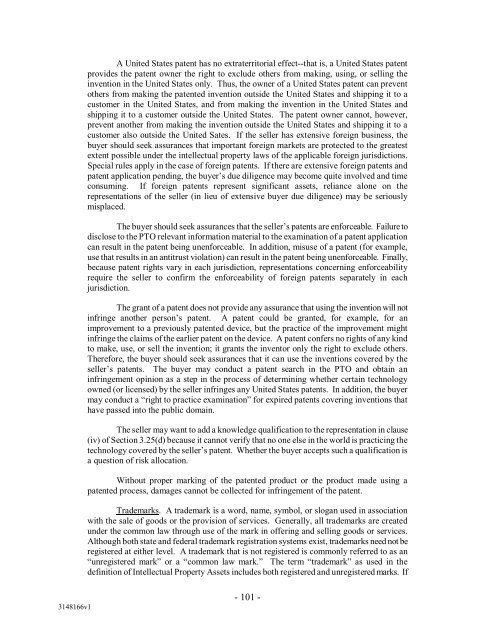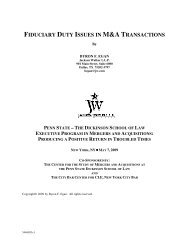asset acquisitions - Jackson Walker LLP
asset acquisitions - Jackson Walker LLP
asset acquisitions - Jackson Walker LLP
Create successful ePaper yourself
Turn your PDF publications into a flip-book with our unique Google optimized e-Paper software.
A United States patent has no extraterritorial effect--that is, a United States patentprovides the patent owner the right to exclude others from making, using, or selling theinvention in the United States only. Thus, the owner of a United States patent can preventothers from making the patented invention outside the United States and shipping it to acustomer in the United States, and from making the invention in the United States andshipping it to a customer outside the United States. The patent owner cannot, however,prevent another from making the invention outside the United States and shipping it to acustomer also outside the United Sates. If the seller has extensive foreign business, thebuyer should seek assurances that important foreign markets are protected to the greatestextent possible under the intellectual property laws of the applicable foreign jurisdictions.Special rules apply in the case of foreign patents. If there are extensive foreign patents andpatent application pending, the buyer’s due diligence may become quite involved and timeconsuming. If foreign patents represent significant <strong>asset</strong>s, reliance alone on therepresentations of the seller (in lieu of extensive buyer due diligence) may be seriouslymisplaced.The buyer should seek assurances that the seller’s patents are enforceable. Failure todisclose to the PTO relevant information material to the examination of a patent applicationcan result in the patent being unenforceable. In addition, misuse of a patent (for example,use that results in an antitrust violation) can result in the patent being unenforceable. Finally,because patent rights vary in each jurisdiction, representations concerning enforceabilityrequire the seller to confirm the enforceability of foreign patents separately in eachjurisdiction.The grant of a patent does not provide any assurance that using the invention will notinfringe another person’s patent. A patent could be granted, for example, for animprovement to a previously patented device, but the practice of the improvement mightinfringe the claims of the earlier patent on the device. A patent confers no rights of any kindto make, use, or sell the invention; it grants the inventor only the right to exclude others.Therefore, the buyer should seek assurances that it can use the inventions covered by theseller’s patents. The buyer may conduct a patent search in the PTO and obtain aninfringement opinion as a step in the process of determining whether certain technologyowned (or licensed) by the seller infringes any United States patents. In addition, the buyermay conduct a “right to practice examination” for expired patents covering inventions thathave passed into the public domain.The seller may want to add a knowledge qualification to the representation in clause(iv) of Section 3.25(d) because it cannot verify that no one else in the world is practicing thetechnology covered by the seller’s patent. Whether the buyer accepts such a qualification isa question of risk allocation.Without proper marking of the patented product or the product made using apatented process, damages cannot be collected for infringement of the patent.Trademarks. A trademark is a word, name, symbol, or slogan used in associationwith the sale of goods or the provision of services. Generally, all trademarks are createdunder the common law through use of the mark in offering and selling goods or services.Although both state and federal trademark registration systems exist, trademarks need not beregistered at either level. A trademark that is not registered is commonly referred to as an“unregistered mark” or a “common law mark.” The term “trademark” as used in thedefinition of Intellectual Property Assets includes both registered and unregistered marks. If3148166v1- 101 -
















